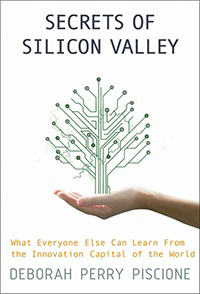Secrets of Silicon Valley: Book review

Deborah Perry Piscione writes in Secrets of Silicon Valley with the breathless, cultish, find-no-faults enthusiasm of someone who's just given up smoking — or just entered the 'gone native' stage of the culture-shocked migrant into unfamiliar territory.
As a student and legislative aide working on Capitol Hill, Piscione writes, she learned about power and access. Cut loose from her political job when Bush (George H. W.) was succeeded by Clinton, she found the meaning of life in Brazil and then settled back in Washington as a media commentator during the Lewinsky scandal and wrote the odd bestseller. Eventually she noticed that ratings depended on decibels rather than worthwhile thought, and she and her husband and their twin toddler sons moved to this best of all possible worlds — great weather, friendly people, healthy attitudes towards work and life...

Piscione begins her brief foray through Silicon Valley history with Hewlett and Packard. From there, she moves into a series of chapters on the various factors that underlie Silicon Valley's reputation as "the innovation capital of the world": Stanford University, the entrepreneurs and engineers, the business models, the ready availability of money and smart venture capitalists, the ecosystem of services, the restaurants and coffee shops that act as cross-company water coolers, the schools and the overall lifestyle. Smart, talented people come to Silicon Valley, drawn by all these things, and never want to leave. The kids who grow up breathing the air of innovation from their dedicated parents and starting their first businesses in grade school are only half the story.
There's no doubt that Silicon Valley is a nice place if you can afford the entry costs — Piscione's own uncle has called it "a very expensive country club". The author herself has done pretty well there, launching three media companies since her arrival in 2006: the women's magazine site BettyConfidential; the women's dealmaking network Alley to the Valley; and the gaming app Chump Genius — plus this book contract. The presence of very successful big companies with research budgets to match should help perpetuate the area's success even while California cities such as San Bernadino and Stockton fight bankruptcy, and the legendary California university system struggles to maintain its quality in the face of repeated funding cuts.
In an epilogue, Piscione asks whether Silicon Valley can be replicated. Her answer to that question is 'no', although she lists places that have tried, such as New York (Silicon Alley), Capetown (Silicon Cape), and Shoreditch (Silicon Roundabout). We'll note that she omits two more UK entries — Scotland (Silicon Glen), and the area around Cambridge (Silicon Fen). Her contention is, however, that other places can learn lessons from Silicon Valley that they can still apply productively.
It's this attitude that makes this book almost cartoonishly American. Even though Piscione herself calls Silicon Valley a "one-industry town" she fails to notice the obvious: that what she is describing has happened elsewhere in other industries, in other places, at other times. Silicon Valley is what Harvard Business School professor Michael Porter calls a 'cluster'. At a lecture Porter gave for the Welsh Development Authority in about 1993, his examples included Italy (shoes and clothing) and — much closer to Piscione's adopted home — Hollywood (entertainment). Someone more familiar with innovations in other places might instead ask: why can countries with so much less resources produce the kind of innovators that Silicon Valley must import to remain competitive?
Secrets of Silicon Valley: What Everyone Else Can Learn from the Innovation Capital of the World
By Deborah Perry Piscione
Palgrave Macmillan
249 pages
ISBN: 978-0-230-34211-8
£17.99 / $27